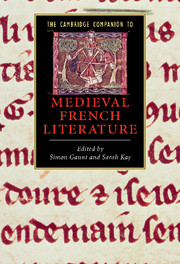Book contents
- Frontmatter
- Introduction
- Part I What is a Medieval French Text?
- Part II What is a Medieval French Author?
- Part III What is the Value of Genre for Medieval French Literature?
- 9 Narrative genres
- 10 Lyric poetry of the later Middle Ages
- 11 Genre, parody, and spectacle
- 12 Theatre and theatricality
- Part IV How can we read Medieval French Literature Historically?
- Appendix: Reference works for Old and Middle French
- Bibliography of medieval French texts
- Suggested Further Reading
- Index
- Series List
9 - Narrative genres
from Part III - What is the Value of Genre for Medieval French Literature?
Published online by Cambridge University Press: 28 March 2009
- Frontmatter
- Introduction
- Part I What is a Medieval French Text?
- Part II What is a Medieval French Author?
- Part III What is the Value of Genre for Medieval French Literature?
- 9 Narrative genres
- 10 Lyric poetry of the later Middle Ages
- 11 Genre, parody, and spectacle
- 12 Theatre and theatricality
- Part IV How can we read Medieval French Literature Historically?
- Appendix: Reference works for Old and Middle French
- Bibliography of medieval French texts
- Suggested Further Reading
- Index
- Series List
Summary
The anonymity of much medieval literature has encouraged and facilitated scholarly studies which posit the notional or actual existence of genres in the minds of medieval authors, audiences, and readers on the one hand, and of modern readers on the other. This chapter will not offer a survey of medieval narrative types but rather consider the validity and usefulness of the concept of genre by looking at a number of individual texts from a generic perspective and by weighing certain kinds of evidence regarding the medieval and modern perceptions of generic form. I will concentrate here on verse literature of the twelfth and thirteenth centuries, that is to say, the period traditionally considered Old, as opposed to Middle, French.
There is little doubt that the near-universality of reference to medieval narratives as, for example, epics, romances, lais, or fabliaux, corresponds both to a modern need to categorize as a means of accessing texts and to shared features that appear to signal generic distinctions. One question that has therefore received much attention is whether the modern perception of genres corresponds to a conscious effort on the part of medieval authors to compose texts their audiences would recognize as belonging to a category, and if so, how strictly defined those categories were. Without actually being a red herring, this question has sometimes proven as obstructive as constructive, and efforts to define genres have often obscured and even sacrificed the qualities of individual texts by attempting to impose conformity on a motley corpus. That said, the very existence of terms such as geste, roman, lai, fablel (fabliau), dit, conte, and so on, attests to an awareness on the part of medieval authors and audiences of both similarity and difference between types of narrative.
- Type
- Chapter
- Information
- The Cambridge Companion to Medieval French Literature , pp. 139 - 152Publisher: Cambridge University PressPrint publication year: 2008
- 1
- Cited by



